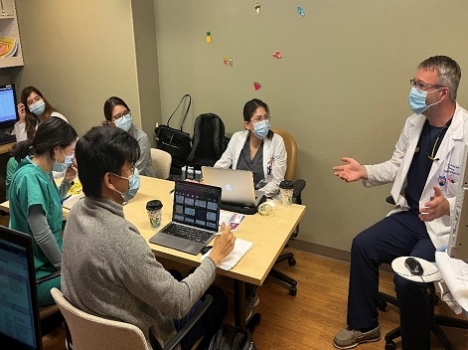
The Internal Medicine Residency Program at Morristown Medical Center offers the following rotations:
Inpatient Rotations
Floor Teams
Our floor teams (AMG1, 2, and 3) are organized geographically to enhance teaching, patient care and communication. We have recently created an academic hospitalist faculty group recruited for their teaching expertise who will cover all resident floor rotations to optimize learning. Each floor team consists of a senior (PGY2 or 3) and interns as well as medical and pharmacy students. Teaching rounds usually begin at 9am with presentations at bedside, hands on teaching on physical exam, and (where relevant) point of care ultrasonography.
- AMG 1 - General medicine pathology
- AMG 2 - Respiratory floor where patients may require ventilatory support, tracheostomy care, with frequent collaboration with and learning from respiratory therapy and our pulmonology team
- AMG 3 – Cardiac floor within the Gagnon Cardiovascular Institute, working in concert with our cardiology fellows and consulting attendings
- Step-Down Unit – An intermediate care unit between general floor and intensive care consisting of a PGY3, PGY2, and several interns rounding in concert with an academic hospitalist paired with a critical care attending
Critical Care
In our critical care rotation, residents work 12-hour shifts in both the 10-bed medical intensive care unit (MICU) and the 10-bed cardiac care unit (CCU). Patients may overflow to our 22-bed Surgical Intensive Care Unit, if needed. Both units are closed units where all patients are under the teaching service. As we are currently without a critical care fellowship, our residents have full access to all procedures on their patients – providing a strength of autonomy, while supervised by our excellent attendings.
The MICU offers interdisciplinary collaboration on many levels. Residents round with a full-time intensivist and work in conjunction with respiratory therapists, pharmacists, and highly trained nurses. Patients are regularly transferred to Morristown Medical Center by helicopter for tertiary care. The CCU offers similar educational experiences in a cardiac setting, with additional rounds with cardiology fellows and a dedicated intensivist team to enhance the academic experience. Our CCU includes complicated patients with LVAD, balloon pumps and impella devices.
Medical Admitting Resident
Our Medical Admitting Resident (MAR) is a PGY-3 resident who works five to six days per week as a triage resident. The MAR evaluates patients in the emergency department and on the floors to assist in determining patient placement on a "teaching" or "non-teaching" service, as well as confirming or determining the appropriate level of care. This rotation can also provide an opportunity for senior residents to serve as a general medical consultant for patients on non-medical services such as surgery, gynecology and psychiatry when the consult residents are not in the hospital.
Night Float Rotation
A PGY-2 Medical Admitting Resident (MAR) triages patients from the emergency department to the appropriate teaching or non-teaching team throughout the hospital. Night Float and Medical Admitting interns cross-cover Step Down Unit patients, teaching team patients and assist with nocturnal admissions. A PGY-3 covers the step-down unit, as well as assisting interns with any issues that arise on the floors. A "nocturnist" (nocturnal hospitalist) is present for resident support and supervision.
Emergency Medicine (EM)
Residents have a two-week rotation in the emergency department, where they optimize the skills needed for the next step of the journey. This rotation is supervised by full-time EM attendings, and residents are exposed to patients experiencing a spectrum of problems, ranging from simple to life-threatening.
Electives
Elective rotations are available in all subspecialty areas and are selected by personal preference and learning needs. Residents may also seek "away electives" with prior approval from the program director. For example, some residents decide to participate in away electives as an "audition" for a program to which they wish to apply for fellowship, while others seek experiences not available locally (tropical medicine, for example). During electives, residents work additional half-day clinic sessions.
Outpatient Rotations
Categorical residents rotate through ambulatory medicine for two weeks during their Y blocks, and have six ambulatory Y blocks per year. Our outpatient practice, Internal Medicine Faculty Associates, is less than one mile away in a state-of-the-art private medical office building. Residents gain broad experience in all aspects of primary care including management of chronic disease, evaluation and management of new complaints, transitions of care, coordination of care, addressing barriers to health and issues with social determinants of health, learning how to effectively communicate with patients whose preferred language is not English, preoperative evaluations, advanced care planning, and preventive health. As they progress through the 3 years, residents gain more autonomy in managing their patient panel, and have dedicated primary care faculty attending preceptors who review and discuss their cases.
A wide variety of ancillary services are available, including on-site social workers, patient navigators, nurses ,and medical assistants, a dedicated clinical pharmacist, collaborative behavioral health care, and a nutritionist, and we have been awarded designations including CPC-Plus and Patient Centered Medical Home Level 3. We use the Epic electronic medical record to facilitate management of care across out- and in-patient spectra.
During their Y blocks, residents have sessions dedicated to their continuity panel of patients (4 sessions per week), administrative time (for panel management), POCUS curriculum half-day and other subspecialty clinical experiences such as HIV, cystic fibrosis, TB, hematology and oncology, endocrinology, neurology and diabetes and more. Residents are permitted one half day per week to choose a “second site” clinic in a field of their choosing, which allows them to have longitudinal experience in an outside ambulatory practice of their choice and gain stronger mentorship.
Preliminary interns rotate in the resident IMFA practice for two weeks where they have dedicated sessions for patient care, and also attend academic half days, sports medicine subspecialty clinic, POCUS half-day sessions, have administrative time and wellness time, and work on an ambulatory medicine or quality improvement topic of interest. After rotating with us in IMFA, preliminary interns then have two weeks of ambulatory elective time where they may rotate in an outpatient office practice of their choice in any field or subspecialty.

